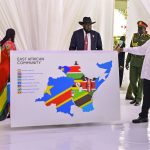Published on 30/04/2025
Parliament has raised serious concerns over loopholes in Kampala Capital City Authority’s (KCCA) ongoing road construction projects, citing inflated costs and poor designs that fail to meet the needs of road users.
The issues were highlighted during the April 16, 2025, plenary sitting, as Tony Awany, Vice Chairperson of Parliament’s Physical Infrastructure Committee, presented the Committee’s report on the 2025/26 Ministerial Policy Statement for the Integrated Transport Infrastructure Services (ITIS) Programme.

Awany noted that KCCA is undertaking road projects of similar scope across different city divisions but at widely varying costs. “The Committee notes with concern that KCCA was concurrently implementing projects of similar scope at varying costs. Despite being in different divisions, the cost discrepancies are unjustifiable,” Awany stated.

During a meeting with the Committee, KCCA was questioned on how road construction costs—especially the unit cost per kilometre—are determined. The Authority revealed that the Ministry of Works and Transport had been allocated UGX 10 billion to conduct a study on the unit cost of constructing one kilometre of road. That study is still ongoing.
The Committee recommended that the Ministry expedite the study and share the findings with Parliament within six months of adopting the recommendation. “This will help standardize road costing and promote transparency and accountability in future projects,” Awany said.
Parliament further warned that many of the current road designs are inadequate and poorly aligned with Kampala’s increasing traffic demands.
“The roads have narrow widths and open drainage channels, which pose serious safety risks to pedestrians. Most roads do not accommodate non-motorised users like pedestrians and cyclists, who are forced to share space with vehicles, increasing their vulnerability to accidents,” Awany added.
KCCA informed the Committee that it plans to cover both new and existing drainage channels to create walkways and improve pedestrian safety in Greater Kampala.
Parliament adopted several recommendations, including the need for KCCA to fast-track these interventions. It also urged the Authority to require property owners near roads to pave the space between their buildings and the roads, including areas above drainage channels, to enhance walkability and eliminate open drains.
MPs also raised concern about the frequent design revisions, which have led to delays as contractors await new specifications. KCCA attributed the changes to outdated designs, noting that some were created years before implementation. For example, old plans specified smaller culverts, which later proved inadequate, requiring upgrades to larger ones to meet current demands.
These delays have resulted in increased costs, with contractors demanding compensation for idle equipment and lack of progress. Parliament urged the Ministry of Works and Transport to update design standards to reflect changing environmental and demographic conditions and promote climate-resilient infrastructure.
“It is important to prioritise project planning and design to avoid costly revisions once work begins. The Ministry should also collaborate with international partners for technical expertise and conduct a comprehensive review of project management frameworks,” Awany said.
The Committee also criticised KCCA’s poor management of ongoing road works, which has caused severe traffic congestion and dust pollution. “There is inadequate traffic control, poor signage around deep excavations, and late or absent notifications about road closures. These shortcomings have disrupted movement and endangered both motorists and pedestrians—especially during heavy rains,” Awany noted.
While KCCA stated that contractors are expected to maintain motorable roads during construction, Parliament called for stricter enforcement of safety measures, dust control, and better communication about upcoming closures. It also urged proper diversion planning and maintenance during ongoing works.
Delays in project completion were another key concern. KCCA cited challenges such as compensation issues and the relocation of utilities like water pipes, electricity lines, and internet cables. The Authority said UGX 10 billion has been earmarked for minor compensations, especially where roads encroach on private land.
Awany revealed that several projects under the Kampala City Road Rehabilitation Project (KCRRP) are behind schedule. Delays have been attributed to poor equipment utilization, resource mobilization, and setbacks in installing street lighting.
Parliament wants KCCA to ensure the availability of funds for utility relocation before construction begins and to improve contractor supervision. It also advised that night shifts be facilitated through adequate lighting to accelerate project completion.
Further, Parliament urged KCCA to enforce regulations requiring buildings to have functional parking. The Committee reported that many buildings had converted basement parking into storage, worsening street congestion.
“KCCA should develop designated parking areas and stopovers for buses and taxis at strategic locations across the city. This would reduce disorganization and improve traffic flow and urban mobility,” Awany concluded.








